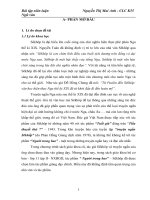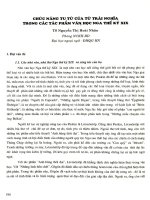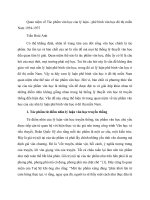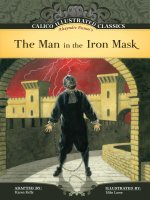tác phẩm văn học của Nathaniel hawthorne the house of the seven gables
Bạn đang xem bản rút gọn của tài liệu. Xem và tải ngay bản đầy đủ của tài liệu tại đây (1.89 MB, 114 trang )
CALICO
niel Hawthorne’s
Natha
CLASSICS
The House of the
Seven Gables
A DA P T E D BY :
Jan Fields
I L L U ST R AT E D BY :
Eric Scott Fisher
CALICO
niel Hawthorne’s
Natha
CLASSICS
House of the
Seven Gables
The
A dapted by: Jan Fields
Illustrated by: Eric Scott Fisher
visit us at www.abdopublishing.com
Published by Magic Wagon, a division of the ABDO Group,
8000 West 78th Street, Edina, Minnesota 55439. Copyright
© 2011 by Abdo Consulting Group, Inc. International copyrights
reserved in all countries. All rights reserved. No part of this
book may be reproduced in any form without written permission
from the publisher.
Calico Chapter Books™ is a trademark and logo of Magic Wagon.
Printed in the United States of America, Melrose Park, Illinois.
042010
092010
This book contains at least 10% recycled materials.
Original text by Nathaniel Hawthorne
Adapted by Jan Fields
Illustrated by Eric Scott Fisher
Edited by Stephanie Hedlund and Rochelle Baltzer
Cover and interior design by Abbey Fitzgerald
Library of Congress Cataloging-in-Publication Data
Fields, Jan.
Nathaniel Hawthorne's The house of the seven gables / adapted by
Jan Fields ; illustrated by Eric Scott Fisher.
p. cm. -- (Calico illustrated classics)
Summary: A prominent New England family suffering under a twohundred-year-old curse is plagued by greed, vengeful acts, and violent
death.
ISBN 978-1-60270-746-7
[1. Secrets--Fiction. 2. Families--Fiction. 3. Haunted houses--Fiction.
4. New England--History--19th century--Fiction. 5. Horror stories.]
I. Fisher, Eric Scott, ill. II. Hawthorne, Nathaniel, 1804-1864. House
of the seven gables. III. Title. IV. Title: House of the seven gables.
PZ7.F479177Nat 2010
[Fic]--dc22
2010002614
Table of Contents
CHAPTER 1: The Old Pyncheon Family . . . . . . . 4
CHAPTER 2: The Little Shop Window . . . . . . . 10
CHAPTER 3: A Day Behind the Counter . . . . . 18
CHAPTER 4: May and November . . . . . . . . . . . 23
CHAPTER 5: Maule’s Well . . . . . . . . . . . . . . . . 28
CHAPTER 6: The Guest . . . . . . . . . . . . . . . . . . 35
CHAPTER 7: The Pyncheon of Today . . . . . . . . 41
CHAPTER 8: Clifford and Phoebe . . . . . . . . . . 46
CHAPTER 9: The Arched Window . . . . . . . . . . 52
CHAPTER 10: The Daguerreotypist . . . . . . . . . 58
CHAPTER 11: Holgrave’s Tale . . . . . . . . . . . . . 64
CHAPTER 12: Phoebe’s Good-bye . . . . . . . . . . 73
CHAPTER 13: The Scowl and the Smile . . . . . . 77
CHAPTER 14: The Flight of the Two Owls . . . . 87
CHAPTER 15: Governor Pyncheon . . . . . . . . . . 92
CHAPTER 16: Alice’s Posies . . . . . . . . . . . . . . . 96
CHAPTER 17: The Departure . . . . . . . . . . . . . 107
1
The Old Pyncheon Family
Halfway down a narrow New England street
stands a rusty, wooden house with seven highpeaked gables. The gables face different
directions like squabbling sisters with their
backs against a single chimney. Directly in front
of the house, a wide elm overshadows the main
entrance. The street, the house, and even the
elm are known by the name of Pyncheon.
With its faded glory, the house looks haunted
by its past. Perhaps it is. This grand house was
not the first home to sit on this spot. A shaggy
thatched cottage once stood in its very spot. It
was owned by Matthew Maule.
A stern Puritan leader named Colonel
Pyncheon wanted the land. His desire grew
4
despite Maule’s stubborn refusal to sell.
Eventually, Maule met the fate of many whose
property became interesting to rich Puritan
leaders—he was accused of witchcraft.
Some have said that Maule did have access
to mysterious powers. At any rate, Maule was
found guilty and was soon executed. Colonel
Pyncheon went to the execution, and Maule
spoke a last chilly prophecy as he pointed a
shaking finger toward the colonel. “God will
give him blood to drink!”
This prediction made many townspeople
nervous, but not the stern colonel. He built the
great house with its seven gables right on the
spot of Maule’s cottage. He even dared to hire
Maule’s own son to oversee work on the house.
Then Pyncheon threw a party.
On the day of the party, food and drink
flowed freely to the guests. They had only one
cause for complaint—the old man never
showed himself at his own party!
5
Finally, the lieutenant governor arrived and
expected to be greeted by his host. He
demanded explanation for Pyncheon’s absence.
A servant explained that the colonel had
ordered that he not be disturbed.
“Colonel Pyncheon has simply lost track of
the time,” the aristocrat insisted. “He will want
to be told of my arrival.”
“Even so,” the servant said nervously, “my
master’s orders were clear and I dare not vary
from them.”
“Pooh,” said the lieutenant governor. “I will
take the matter into my own hands.” And the
man stomped loudly to the colonel’s door with
a cluster of guests following him. He pounded
on the door several times with no response.
“Very strange,” the man muttered. As he
turned the door handle, a gust of wind flung the
door open wide.
Colonel Pyncheon sat in an oaken chair
beneath a huge portrait of himself. At first, the
portrait and the man seemed to glare together
6
7
at the group. But then, the colonel’s young
grandson darted into the room. He made his
way halfway to the glaring figure when he
stopped and began screaming.
Pyncheon’s beard was soaked through with
blood, and more blood ran down his collar. The
iron-hearted old Puritan was dead! A single
sentence passed among the group in whispered
awe, “God hath given him blood to drink!”
Now, the heirs of Colonel Pyncheon received
his house and wealth, but one thing they did
not get as they expected. The colonel had
spoken often of his ownership of a great piece
of land in Maine. This land would be of
enormous worth, but the paperwork to support
it was never found.
Over the years, it became less and less likely
such papers would be honored even if they
were found. But the story of this great land was
handed down from Pyncheon to Pyncheon to
be dreamed about and longed for.
8
The Pyncheon wealth seemed to grow less
with each generation, while misfortune
increased. One elderly Pyncheon had the
misfortune of being murdered by his own
nephew—or so the courts decided before
sending the young man to prison.
Finally, there remained only one truly
wealthy Pyncheon heir. This heir was a lawyer
with the same grasping nature of the original
ancestor.
Such a grand family was reduced to a lawyer,
a murderer, a young country cousin, and the
sole inhabitant of the Pyncheon house: an
elderly spinster. And it is with her that we
begin.
9
2
The Little Shop Window
Before sunrise, Miss Hepzibah Pyncheon
stood in front of her mirror and glared at her
image. She was a pale, thin, rusty-jointed
maiden of sixty years. But, she was no more
unhappy with her appearance than she had
been at any hour of her life.
Her scowl was habit, not anger. Miss
Hepzibah’s vision was poor and the constant
scowl came from her efforts to see beyond the
end of her own nose.
Though she looked hard and bitter, nothing
could be further from the truth. She was
tender-hearted and devoted to her brother,
though he was far away and in horrible
10
circumstance. Her only character flaws were
shyness and more than a little family pride.
Hepzibah glanced at a miniature of her
gentle, beautiful brother. “Don’t be ashamed of
me,” she whispered. “I’m doing this for you.”
She hurried through the darkened passages
of the house, pausing only once in a shadowy
parlor. The room contained some antique
tables and uncomfortable chairs scattered about
on the worn carpet. There were only three
truly noteworthy pieces: a framed map of the
mythic Pyncheon holdings in Maine, a fine oak
chair, and the portrait of old Colonel Pyncheon.
Miss Hepzibah glared up at the portrait and
then bowed her head. What would Colonel
Pyncheon think of what she was about to do?
She shook herself and hurried on to her
destination.
On the lowest level, in a gable facing the
street, a Pyncheon had set up a shop nearly a
century before. The shop was closed soon after
11
and left undisturbed for many years as the
family tried to forget such a blot on their
history. The Pyncheons were not shopkeepers!
And yet, Miss Hepzibah had polished the
floors and counters of the shop. She had
stocked it with trinkets and toys. Gingerbread
elephants tramped across the windowsill. Tall
barrels of flour, apples, and cornmeal stood in a
neat row near the counter. The antique scale
was as polished as rust and ruin would allow.
Like many aging gentlewomen, Miss
Hepzibah was opening a shop. She already had
a small income from renting part of the house
to a young photographer. But that brought in
so little she was forced to seek other income or
starve. Yet no occupation seemed less suited to
the shy, scowling woman than selling things.
Miss Hepzibah had considered her options.
Her hands trembled too much to be a
seamstress. She had toyed with the idea of
opening a school, but she simply did not like
children. They frightened her, and she
12
suspected that modern children actually knew
more than she.
As Miss Hepzibah bustled around the shop,
her sighs came so rapidly that it seemed she
must be a thing of steam and not a human at all.
Finally, she hauled the bar free from the door
and hung an open sign with trembling hands.
This last action seemed to sap the last of
Hepzibah’s courage. She dashed back into the
house, threw herself in the oak chair, and wept.
As Miss Hepzibah Pyncheon sat on the oak
chair with her hands over her face, she heard a
terrifying sound. The little bell suspended over
the shop door tinkled. Her first customer had
arrived!
She leaped to her feet and rushed into the
shop. With her pale face and scowl, she looked
better prepared to face a burglar than a
customer.
The customer stood in the doorway. It was
a slender young man in his early twenties with
a brown beard and mustache. He wore a simple
13
summer suit and a straw hat. He met the scowl
of Miss Hepzibah without alarm, as he had seen
it many times before. This was the boarder in
her house.
“My dear Miss Pyncheon,” he said, “I am glad
to see you have begun your adventure. Best
wishes. How may I help you on this first day?”
The old woman took one look at the kind
face and burst into tears. “Oh, Mr. Holgrave, I
wish I were dead,” she wailed.
“Oh, believe me, Miss Hepzibah, these
feelings will pass,” he said. “I believe this is the
best thing you could do. It will pull you out of
the shadows and warm your veins. Trust me.”
“I do not understand such modern notions,”
she said. “And I do not wish to.”
“Then we shall never more speak of them,”
he said kindly. “But I believe you are doing a
brave thing. And I have come to purchase
biscuits for breakfast.”
“Let me be a lady a moment longer,”
Hepzibah said with a rare smile. “A Pyncheon
14
must not take money from her only friend for
a morsel of bread.”
With his wrapped parcel, Holgrave slipped
out, leaving a much cheerier Hepzibah. But it
was a short-lived cheer, as she overheard two
workmen chattering outside her door.
“See here, Dixey!” cried one rough voice.
“Trade seems to be looking up on Pyncheon
Street!”
15
The second man made a rude noise. “That
old woman’s face is enough to frighten Old
Nick himself. I can’t imagine customers
standing for such a glare.”
“These cent shops never come to much,” the
first man said glumly. “My wife kept one for
three months and lost five dollars!”
“Poor business,” replied Dixey as they walked
on. “Poor business.”
Hepzibah found herself hurt by their
prediction of doom for her business. She was
more hurt still that they seemed so casual about
her ruin.
The shop bell tinkled again. A sturdy little
boy marched in with his school slate under his
arm. He stopped short as Hepzibah scowled
down at him.
“Well, child,” she said, “what did you want?”
“The gingerbread man in the window,” he
said, holding out his cent.
Hepzibah handed the child the cookie and
waved away his penny. She could not imagine
16
taking a small child’s pocket money for a bit of
stale gingerbread.
The boy dashed outside, leaving the door
wide open as he bit the head off his cookie.
Hepzibah grumbled as she marched over to
close the door and replace the gingerbread man
with another.
No sooner had she gotten the door closed
than the bell rang again. The boy was back.
Crumbs decorated his face and clothes. “I want
that one too,” he said, pointing at the new
cookie.
Miss Hepzibah suspected this could go on all
day, so she asked for his penny. He turned it
over and carried the second sweet out of the
shop. Miss Hepzibah stared at the penny in her
hand. She had done it. She was the keeper of
a cent shop.
17
3
A Day Behind the Counter
As more customers came and went, many
had complaints. Hepzibah’s cotton thread was
rotten. She had no tobacco. Five people left in
a huff after learning she had no root beer.
Toward noon, Hepzibah caught sight of a
tall, portly gentleman across the street. He
stared toward the House of the Seven Gables
as he mopped his bald head with a bit of linen.
When he caught Hepzibah’s eye, his frown
turned to a smile of the sunniest good humor.
He bowed to her and she answered his smile
with a deeper scowl.
“Go away, Cousin Jaffrey,” she whispered. “I
will do as I like. Pyncheon House is my own
while I’m alive!”
18
The gentleman walked toward the shop. He
clearly intended to visit, but his path was
blocked when the young gingerbread lover
dashed ahead of him to buy a gingerbread
elephant for his lunch. The man passed on
down the street instead.
Hepzibah looked after him, murmuring,
“The smile does not fool me. Let Jaffrey
Pyncheon beware lest he draw down the
Pyncheon curse again.”
Again, the shop bell rang. This time it
signaled the arrival of a thin, ancient figure
known in the neighborhood as Uncle Venner.
He had seemed old even when Hepzibah was a
girl. The simple old man thought himself wise
and often gave advice during his visits.
“So, you have really begun trade,” he said.
“Well, I’m glad to see it. Young people should
never live idle in the world.”
“Thank you, Uncle Venner,” Hepzibah said,
smiling. She had not been called young for
some time.
19
“I met your cousin, the judge,” the old man
said. “He bowed to me. He has a most
remarkable smile.”
“Yes,” Hepzibah said tightly. “My cousin is
thought to be pleasant.”
Uncle Venner nodded and said, “I must say,
I’m surprised one such as the judge would let a
cousin fall upon hard times.”
“My store has nothing to do with my cousin,”
she said.
“Well,” the old man said, “I expect it will be
short enough. Something better will turn up
for you, I’m sure of it!” Suddenly the old man
gestured her close. “When do you expect him
home?”
“Whom do you mean?” she asked faintly.
“Ah, I see you don’t want to talk of it,” he
said. “No matter, though there is talk of it all
over town. I remember him, Miss Hepzibah.”
The old man left Hepzibah in a cloud of
confusion. She seemed to pass the rest of the
20
day as in a dream, making mistakes with nearly
every customer. It was a great relief when the
time came to close the shop for the night after
making one last sale of gingerbread to her most
faithful young customer.
As she closed up, she spotted a carriage
pulling up before the house. For an instant,
Hepzibah held her breath, thinking it might be
him home now. But a lively young woman in a
21
cheerful straw bonnet sprang from it. The
driver carried her bags to the door of the house.
“This must be Phoebe,” Hepzibah muttered,
for she often talked to herself in the empty
house. “She has the look of her father about
her. How like country cousins to visit without
a warning. Well, she can only stay one night,”
Hepzibah insisted as she unbolted the door. “If
Clifford were to find her here, it might disturb
him.”
22
4
May and November
Phoebe Pyncheon awoke when the crimson
glow of sunrise crept between the curtains of
her bed. At first, she did not recognize the
room or the heavy bed curtains.
As she climbed from the bed, memories of
her arrival and chat with Hepzibah came to
mind. Phoebe had told Hepzibah that her
mother’s second marriage made it better if
Phoebe moved to another home.
Phoebe dressed quickly and peeped out the
window to see that her room overlooked the
garden. She saw a tall rosebush covered with
beautiful white roses. Hurrying down the
creaking staircase, she found her way to the
garden. She gathered a great armload of the
23









